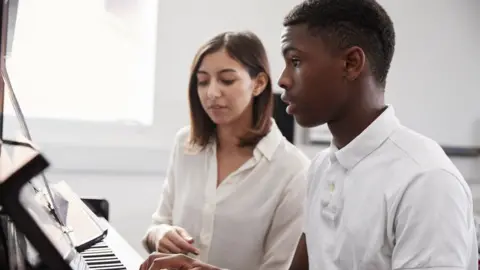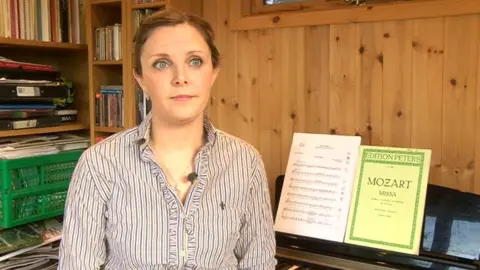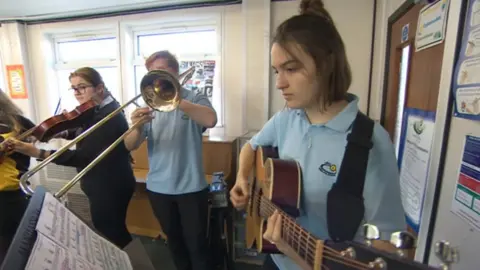Teaching music in school 'ticking boxes' as numbers fall
 Getty Images
Getty ImagesThe teaching of music in school is a box-ticking exercise, according to a singer who performed at the wedding of Prince Harry and Meghan Markle.
Soprano Elin Manahan Thomas spoke out after figures revealed the number of people in Wales studying music at A-level has halved in 10 years while GCSE entries has seen a 40% drop.
She said the subject was not given the same respect as other subjects.
The Welsh Government said there were fewer people taking A-levels and GCSEs.
The figures by the Joint Council for Qualifications showed 370 students sat the A-Level music exam in June 2018 compared to 737 in 2008.
At GCSE there were 3,779 students in 2008 but this fell to 2,201 this year.

Swansea-based Mrs Thomas, who studied the subject at the city's Ysgol Gyfun Gwyr, said it is seen "as a bit of a frill on the side".
"I think there's been a big shift over the last 20 or 30 years to focus on the sciences, on maths and on sports," she added
"I think it's really important to realise that music covers all those bases. It uses a part of the brain that other parts don't use.
"It helps you to concentrate, it helps you with your Maths undoubtedly, it helps you as well to understand languages, and it gets to the very core of who you are as a person.
"There's been a bit of a surge recently in blocking out the enjoyable and doing the necessary.
"We have to tick the boxes. To be honest we can't justify music just in terms of ticking boxes because it goes way beyond all other things, so do all of the arts and we need to keep supporting all of the arts.

She added: "I also don't see where we're going without embedding music in young people at this point.
"There's not a person in this world you can ask what's your favourite song who would look at you dumbly and say 'I don't know what a song is'."
A Welsh Government spokesman said: "We're committed to giving learners experiences in the arts, culture and heritage through a balanced curriculum.
"Music and art and design is compulsory to all pupils in Key Stage 2 and 3. The new curriculum, which is being developed at the moment consolidates the important role of the arts in education."
